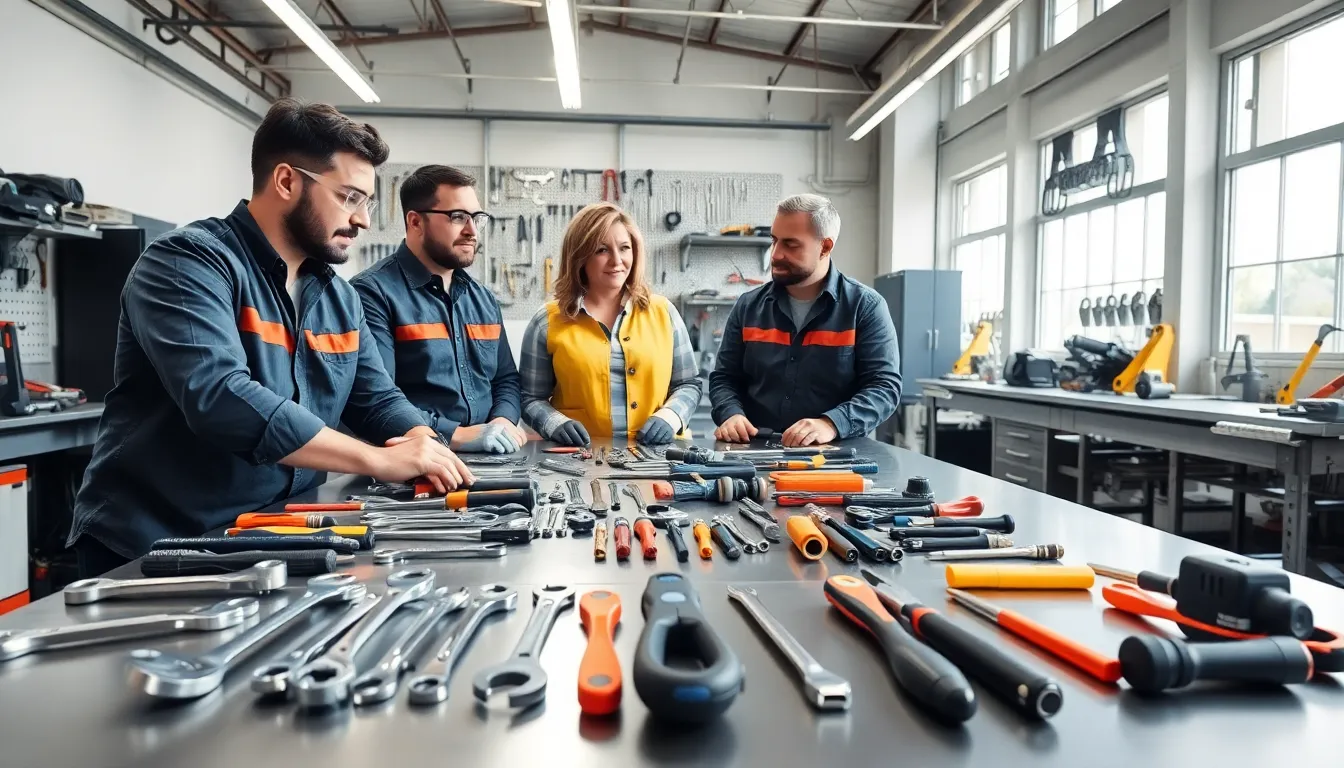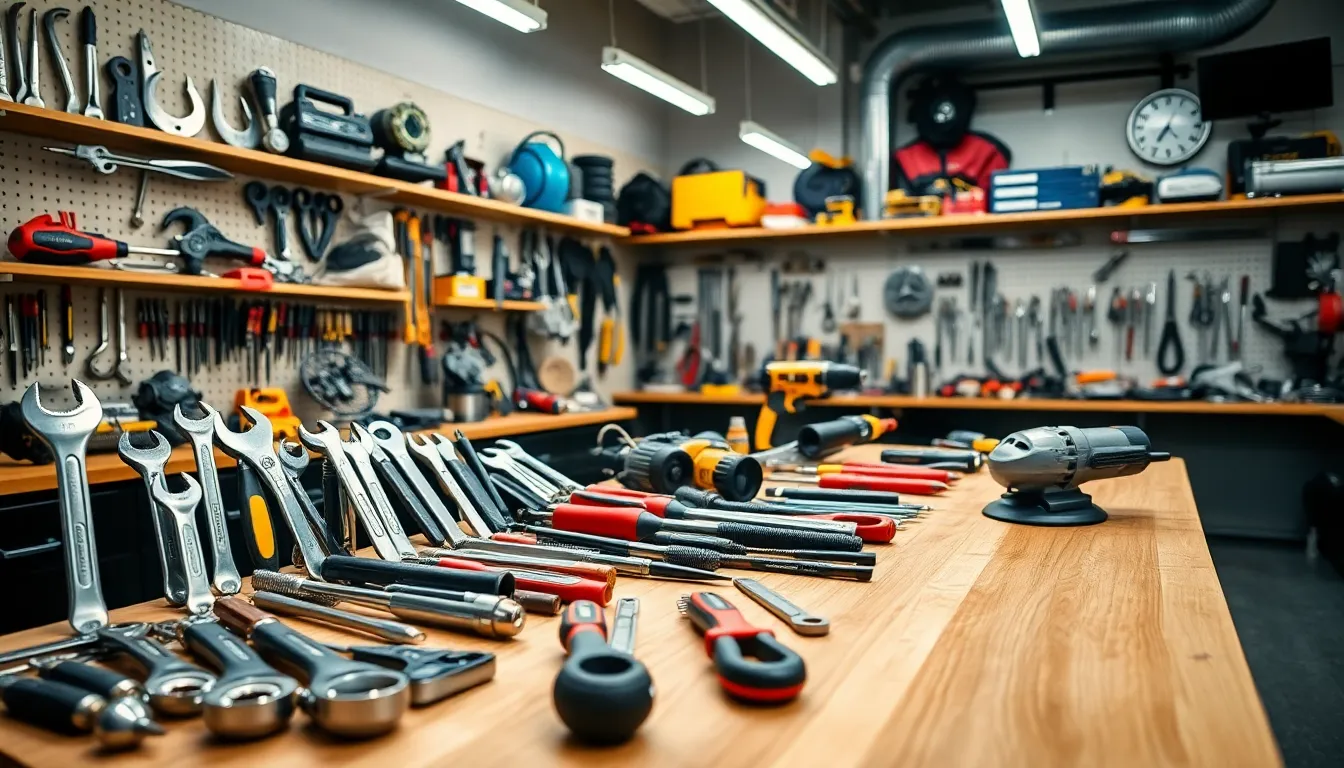Step into the world of mechanical workshops, where the sweet scent of grease mingles with the sound of power tools, and you’re bound to find a treasure trove of gadgets. If you’ve ever tried fixing your car or building that IKEA monstrosity, you know the right tools can make the difference between a minor accomplishment and a complete disaster. Forget about finding a needle in a haystack: it’s all about the right tools in your toolbox. This guide will take you through the essential hand tools, power tools, specialized equipment, and even how to keep those babies in tip-top shape. So buckle up, because we’re about to jump into the nuts and bolts of mechanical workshop tools.
Table of Contents
ToggleEssential Hand Tools for Mechanical Workshops

Every great workshop starts with an arsenal of hand tools. These trusty companions are indispensable for a variety of tasks, from tightening bolts to shaping materials.
Wrenches
Wrenches, in their many forms, are essential. If a fastener needs turning, a wrench is the go-to tool. Adjustable wrenches, socket wrenches, and torque wrenches each serve a unique purpose. Understanding the right wrench to use can save significant time and frustration.
Screwdrivers
Screwdrivers are perhaps the unsung heroes of mechanical workshops. With a drive for versatility, these tools come in various types, including flathead and Phillips screwdrivers. Having a set with magnetic tips can save countless trips to the floor in search of fallen screws.
Pliers
When it comes to gripping, bending, or cutting, pliers are indispensable. Needle-nose pliers fit in tight spaces, while slip-joint pliers offer flexibility for various gripping needs. Both are staples in any workshop.
Hammers
A good hammer can transform frustration into satisfaction. From the classic claw hammer for everyday repairs to a sledgehammer for demolition, having the right hammer can make all the difference in project outcomes.
Common Power Tools Used in Mechanical Work
Power tools have revolutionized mechanical workshops, making tasks easier and quicker than ever. Here’s a look at some common power tools that are must-haves:
Electric Drill
An electric drill is undoubtedly a cornerstone of any mechanical workshop. It allows users to drill holes or drive screws with ease, often with adjustable speed settings for precision work. The right bits can tackle wood, metal, or plastic effortlessly.
Angle Grinder
For cutting metal or smoothing rough edges, an angle grinder shines. Mechanics appreciate its versatility, using it to grind, polish, and even cut various materials. With the right discs, this tool can tackle a myriad of tasks.
Impact Wrench
When speed is of the essence, an impact wrench steps up to the plate. It’s capable of exerting significant torque, making it ideal for loosening stubborn bolts in record time. This tool is particularly popular in automotive shops.
Jigsaw
A jigsaw’s ability to make intricate cuts in wood or metal makes it a valuable asset in mechanical workshops. With varying blade types, it can handle everything from curved cuts to straight lines with finesse.
Specialized Tools for Precision Work
In the mechanical world, precision is paramount. Specialized tools ensure that every task, from fitting parts to intricate designs, is executed flawlessly.
Calipers
Calipers measure internal and external dimensions with remarkable accuracy. Whether working on a model or a real engine part, having a set of digital calipers can make precise readings as easy as a click.
Micrometers
Used for more delicate measures, micrometers can measure thickness and small distances down to thousandths of a millimeter. These tools are essential in applications where precision is non-negotiable.
Torque Wrench
While we briefly touched on this tool earlier, it deserves a spotlight of its own. Precision is critical when fastening nuts and bolts in mechanical assemblies. A torque wrench ensures fasteners are tightened to the specifications necessary for safety and efficiency.
Safety Equipment in Mechanical Workshops
Safety might not be the first thing that pops into your head when you think about mechanical tools, but it’s an essential consideration.
Safety Goggles
Protective eyewear is critical. Flying debris or sparks can cause serious eye injuries, making safety goggles non-negotiable in any workshop. Opt for goggles that fit securely and provide clear visibility.
Gloves
Gloves protect hands from sharp edges and offer grip while handling tools or materials. But, it’s vital to choose gloves that provide comfort and dexterity to avoid accidents.
Ear Protection
Power tools can be noisy. Prolonged exposure to high decibel levels can damage hearing. Earplugs or earmuffs mitigate this risk, allowing professionals to work comfortably and safely.
Maintaining Your Workshop Tools
Even the best tools can falter without care. Here are some tips for ensuring workshop equipment remains in top shape:
Regular Cleaning
Dust and grime can accumulate quickly. A regular cleaning regime using appropriate cleaners for different materials ensures tools remain functional and don’t succumb to rust.
Regular Calibration
For tools requiring accuracy, like torque wrenches or calipers, regular calibration checks are essential. This keeps measurements precise and safe.
Proper Storage
Tools perform best when stored correctly. A well-organized toolbox not only lengthens tool life but also saves time when working on projects. Magnetic strips, pegboards, and tool chests help keep everything in its right place.
Innovations in Mechanical Workshop Tools
Innovation is the lifeblood of any industry, and mechanical tools are no exception. Recent advancements have transformed the landscape.
Smart Tools
Modern technology has introduced smart tools to the workshop. These tools often include features like integrated sensors or Bluetooth connectivity, allowing users to track usage and performance data.
Cordless Technology
Cordless power tools have made leaps and bounds in battery technology, providing the freedom of movement without sacrificing performance. They are now more powerful, lightweight, and easier to use, making them favorites in mechanical workshops.
Sustainable Tools
As the world shifts toward sustainability, manufacturers are creating tools with eco-friendly materials and processes. Electric tools now boast longer battery life and lower energy consumption, significantly reducing their environmental impact.



